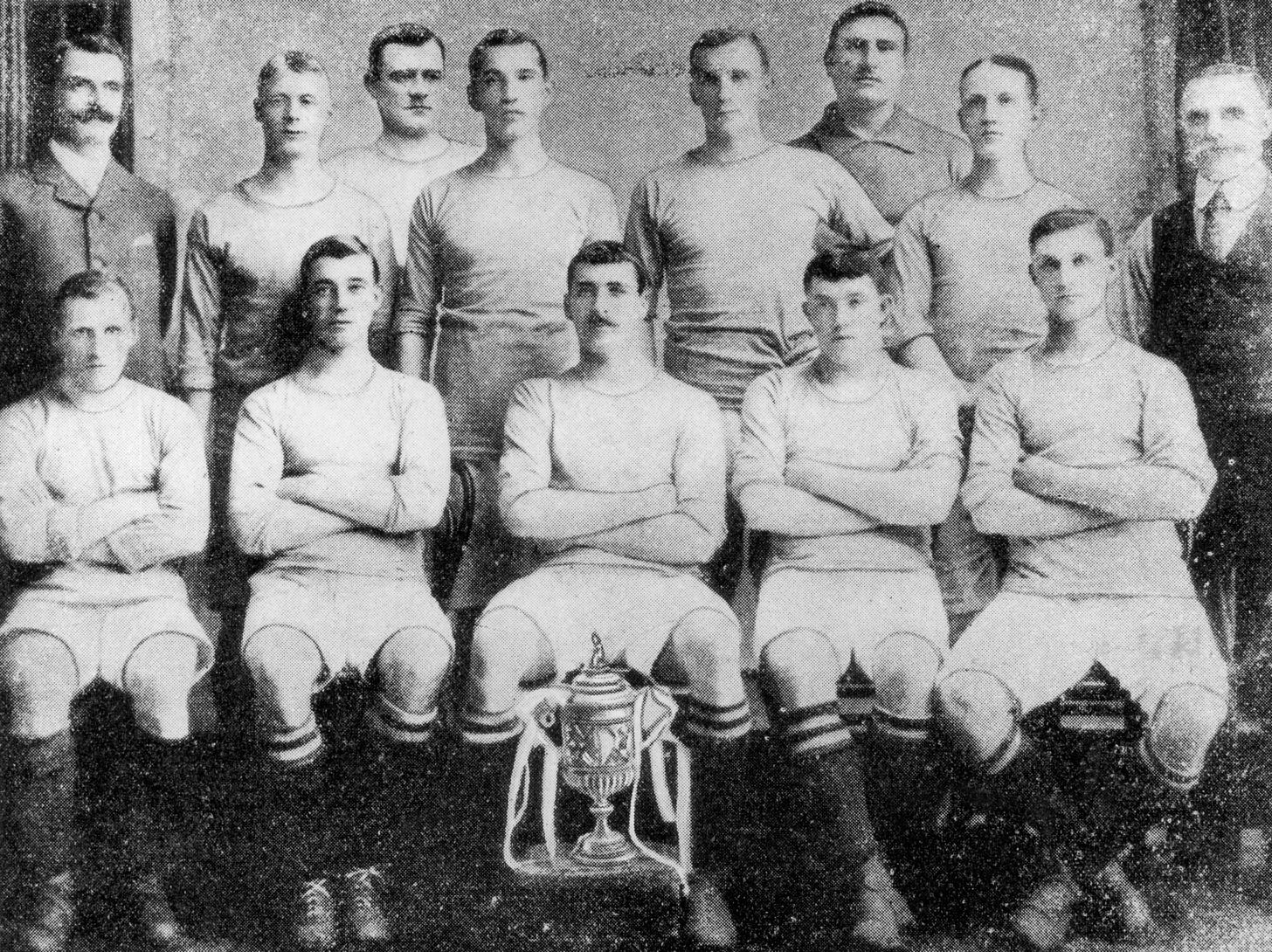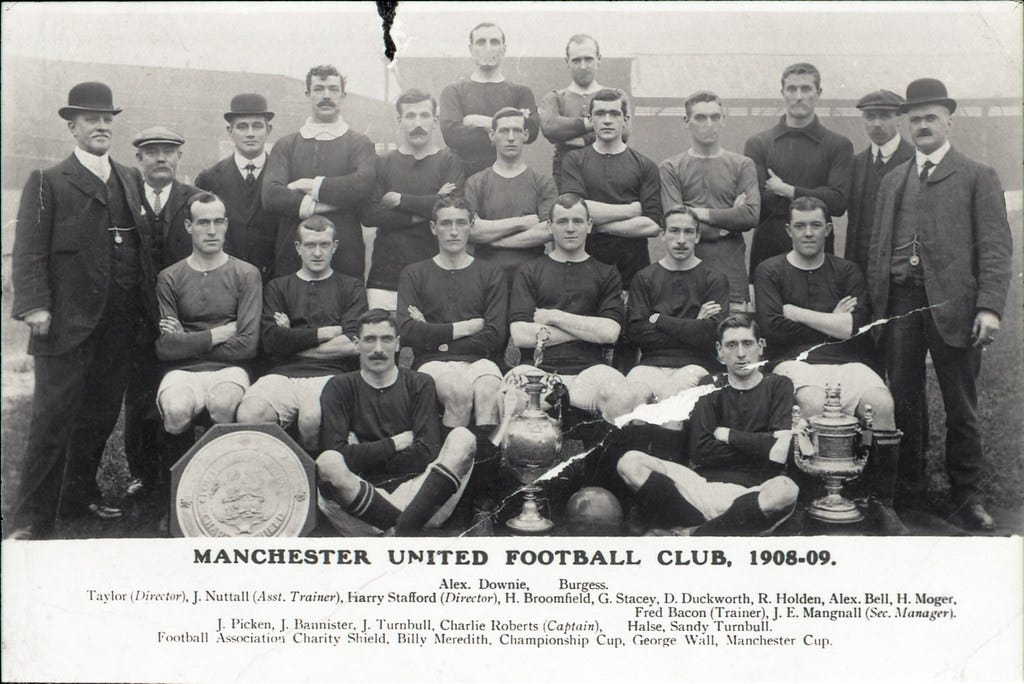The Manchester Coup: How United's Rise to Glory Followed City's Shocking Scandal
(Manchester City’s FA Cup Winning Team 1904)
With 115 charges hanging over Manchester City for various breaches of financial fair play, it is not the first time in the club’s history they have been under investigation for off the field skullduggery.
Back well over a century ago, to the year 1905 precisely, Billy Meredith, arguably the best and well known footballer in the world at that time, was under investigation and subsequently found guilty for bribery. Little did the British footballing public know that this would open a can of worms that would devastate the blue half of Manchester.
Meredith, as the 1904/05 season was drawing to its conclusion, was alleged to have offered Aston Villa’s Alex Leake £10 to throw their final day of the season clash with title chasing Man City. The Citizen's lost the game anyway, but their forward Sandy Turnbull got into a physical altercation with Leake.
The FA launched an investigation regarding the incident, where somehow it came to light from a mysteriously unknown source that Leake had been offered a bribe. The Villa player admitted that Meredith had spoken to him about throwing the game but he thought it was ‘more a joke, than anything to take seriously.’ The FA never did reveal their source, shrouding the whole case in controversy.
Meredith Banned And The City House of Cards Comes Tumbling Down
(Manchester City and Manchester United Legend Billy Meredith)
Never given the chance of a fair trial or to give his side of events, Meredith was handed a one year suspension and fined. Manchester City refused to stand by their star asset, the Welsh Wizard had his pay stopped. Understandably angry at this series of events, he exposed the corruption that had been going on behind the scenes which had helped the Hyde Road side (City moved to Maine Road in 1923) attract better players to win promotion in 1902/03, win the FA Cup in 1904, and finish second in 1905.
Back in 1905 the maximum wage was still in full effect, where a player regardless of team or league could earn more than £4 a week. City navigated this by paying extra with the under the counter deals, bankrolled by the newspaper magnate Edward Hulton. Meredith for example, claimed for years he had been paid £6 per week. The club in their FA Cup winning year paid out bonuses of £612 12s 6d.
How City were fit to pay for this was by taking some of the gate receipts, putting the money into the director’s bank accounts, where it was then paid to the players. After looking at the books, the authorities easily sussed out the level of financial deception that had been going on.
17 players were fined, suspended, banned from playing for City again, and suspended until New Year's Day 1907. This is the point of the story that Manchester United came in.
City Loss Is United’s Gain
(Manchester United Manager Ernest Mangnall)
Formerly known as Newton Heath and formed in 1878 (The club only changed its name to Manchester United in 1902), Manchester United were not the behemoth of an institution we all know today. Up until the scandal suffered by their cross city rivals, there was little to no success to celebrate.
Chairman John Henry Davies, a Brewery owner, had saved United from going out of business in 1902 and who had insisted on the name change. He was a very ambitious custodian and wanted to see a return on his investment. Manager Ernest Mangnall was appointed in October 1903 with the aim of bringing trophies to the long suffering Red’s supporters.
United were in the second division when Mangnall arrived and it took until the 1905/06 season for them to achieve promotion through finishing 2nd in the league, thanks to shrewd work in the transfer market with goalkeeper Harry Moger, centre-half Charlie Roberts and wing-half Alex Bell arriving at Bank Street (Old Trafford opened in 1910).
United had set their sights on winning the top prizes now that they were back in the top-flight. With Man City unable to play the banned 17, they were forced to hold an auction to sell the players. The auction was held at the Queen’s hotel in Manchester, but Mangnall had struck deals with City directors, therefore rigging the whole affair.
Herbert Burgess, Sandy Turnbull, and Jimmy Bannister crossed the City, signing for virtually nothing, and more remarkably Billy Meredith was signed on a free. To say United has struck gold was a massive understatement, the equivalent of Ruben Dias, Erling Haaland, Kevin De Bruyne, and Bernardo Silva swapping the Etihad for Old Trafford these days.
With their ban served, all four would make their debut on New Years Day 1907 in a 1-0 home win over Aston Villa. Sandy Turnbull, as a sign of things to come, grabbed a goal on his first start to earn all 3 points. The club had an average campaign finishing the 1906/07 campaign in 8th place and in the FA Cup they were dumped out of the competition in the first round after a replay by Portsmouth.
Glory Glory Man United
(United Team Pictured With Their First Ever Top-Flight League Title And The Charity Shield 1908)
Despite losing 9 games in the league, 1907/08 would finally see the First Division title come to Manchester for the first time. Despite losing 9 and drawing 6, Man United would prove too strong for the other challengers, finishing an incredible 9 points ahead of 2nd place Aston Villa (it was 2 points a win in those days). After losing away at Middlesbrough on matchday 4, Mangnall’s charges would win 10 straight games to provide the platform for their success.
Possessing a strong attack with Bannister, Meredith, and Turnbull terrorising the opposition, United hit the net 75 times in the league, scoring the most goals of any side. Defensively they were also strong with Moger in goal and Bell, Burgess, Duckworth, and Roberts in defence; United had the second best defensive record that season.
The quest for the double was surprisingly ended by 2nd Division side Fulham who had only entered the Football League that season, the Cottagers running out 2-1 winners in the fourth round.
There would be further success for the club thanks to winning the inaugural Charity Shield. The Charity Shield was inaugurated in 1908, where the winners of the First Division would play the winners of the Southern League. Just 2 days after the normal season had ended, United would draw 1-1 with QPR at Stamford Bridge. After the FA decided against sharing the trophy, the replay would take place the following September where the ‘Red Devils’ thrashed the same opposition 4-1 once again at Stamford Bridge.
Though the league would slip from their grasp and finish the season in 13th, a first ever FA Cup triumph was achieved thanks to a 1-0 win over Bristol City. Sandy Turnbull who despite having a disappointing all round season,was as always the reliable source on the big occasion in the cup, grabbing the winning goal at Crystal Palace.
With the bank balance well in the black and the club having great success on the pitch, it was felt a new ground was needed to match the ambition of the club. Old Trafford opened in February 1910 with a league match where United suffered a 4-3 defeat to Liverpool. With a reported capacity of 77,000, the new ground was easily the largest football ground in England until Wembley opened in 1923.
The end of the first great Manchester United era
(Manchester United Team Photo After Winning The 1910/11 Division 1 Title)
Man United would win their last top-flight league title for 41 years, bagging the 1910/11 First Division, finishing just 1 point above Aston Villa. In the penultimate game of the season defeat away at Villa Park looked costly only for the Birmingham based side to draw their game in hand 0-0 with Blackburn Rovers and lose 3-1 to Liverpool on the final day. A comprehensive 5-1 win at Old Trafford was enough to see United get over the finish line.
The decline would set in at the club with a 13th place finish in 1911/12. At the end of that season Ernest Mangnall would leave Old Trafford and join Manchester City as manager. Over the coming years star players of the first great side would depart before football would pause for the outbreak of the First World War. With football bowing to public pressure, the Football League would be on hiatus from 1915-1919. Scorer of United’s FA Cup winning goal in 1909 Sandy Turnbull was killed during the battle of Arras in 1917.
Manchester City in contrast to their rivals would suffer relegation to the 2nd division in 1909, coming straight back up where they mainly bounced around the middle and lower ends of the table until the outbreak of war. What could have been the start of their golden period was shut down by an innocuous fight that, in a cruel twist of fate that benefited their hated city rivals.
In current times City face a litany of charges that they will have to be held accountable for, it is highly unlikely though they will face a similar fate to the generation of 1906.








